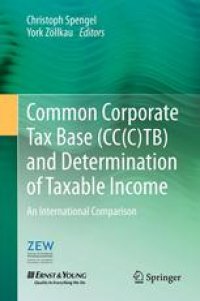
Ebook: Common Corporate Tax Base (CC(C)TB) and Determination of Taxable Income: An International Comparison
- Tags: Private International Law International & Foreign Law Comparative Law, Business Taxation/Tax Law, Financial Law/Fiscal Law
- Year: 2012
- Publisher: Springer-Verlag Berlin Heidelberg
- Edition: 1
- Language: English
- pdf
The study conducted by the Centre of European Economic Research (ZEW), the University of Mannheim and Ernst & Young contributes to the ongoing evaluation of the proposal for a Draft Council Directive on a Common Consolidated Corporate Tax Base (CC(C)TB) released by the European Commission on March 16, 2011. For the first time, details on the determination of taxable income under the proposed Council Directive are compared to prevailing corporate tax accounting regulations in all 27 Member States, Switzerland and the US. The study presents evidence on the scope of differences and similarities between national tax accounting regulations and the Directive’s treatment in a complete, yet concise form. Based on this comprehensive comparison, it goes on to discuss remaining open questions and adjustments needed if the Directive is to be implemented in national tax law. Readers seeking a basis for taking an active part in the public debate will find a valuable source of information and a first impression of how the proposed CC(C)TB would affect corporate tax burdens in the European Union.
The study conducted by the Centre of European Economic Research (ZEW), the University of Mannheim and Ernst & Young contributes to the ongoing evaluation of the proposal for a Draft Council Directive on a Common Consolidated Corporate Tax Base (CC(C)TB) released by the European Commission on March 16, 2011. For the first time, details on the determination of taxable income under the proposed Council Directive are compared to prevailing corporate tax accounting regulations in all 27 Member States, Switzerland and the US. The study presents evidence on the scope of differences and similarities between national tax accounting regulations and the Directive’s treatment in a complete, yet concise form. Based on this comprehensive comparison, it goes on to discuss remaining open questions and adjustments needed if the Directive is to be implemented in national tax law. Readers seeking a basis for taking an active part in the public debate will find a valuable source of information and a first impression of how the proposed CC(C)TB would affect corporate tax burdens in the European Union.
The study conducted by the Centre of European Economic Research (ZEW), the University of Mannheim and Ernst & Young contributes to the ongoing evaluation of the proposal for a Draft Council Directive on a Common Consolidated Corporate Tax Base (CC(C)TB) released by the European Commission on March 16, 2011. For the first time, details on the determination of taxable income under the proposed Council Directive are compared to prevailing corporate tax accounting regulations in all 27 Member States, Switzerland and the US. The study presents evidence on the scope of differences and similarities between national tax accounting regulations and the Directive’s treatment in a complete, yet concise form. Based on this comprehensive comparison, it goes on to discuss remaining open questions and adjustments needed if the Directive is to be implemented in national tax law. Readers seeking a basis for taking an active part in the public debate will find a valuable source of information and a first impression of how the proposed CC(C)TB would affect corporate tax burdens in the European Union.
Content:
Front Matter....Pages i-xxviii
A. Introduction....Pages 1-3
B. Common Corporate (Consolidated) Tax Base: Some Institutional Details....Pages 5-15
C. The Determination of Taxable Income: A Comparison of the CCCTB Proposal and Current Practice in the EU Member States, Switzerland and the United States....Pages 17-84
D. Results....Pages 85-98
E. Summary of Conclusion....Pages 99-100
Back Matter....Pages 101-103
The study conducted by the Centre of European Economic Research (ZEW), the University of Mannheim and Ernst & Young contributes to the ongoing evaluation of the proposal for a Draft Council Directive on a Common Consolidated Corporate Tax Base (CC(C)TB) released by the European Commission on March 16, 2011. For the first time, details on the determination of taxable income under the proposed Council Directive are compared to prevailing corporate tax accounting regulations in all 27 Member States, Switzerland and the US. The study presents evidence on the scope of differences and similarities between national tax accounting regulations and the Directive’s treatment in a complete, yet concise form. Based on this comprehensive comparison, it goes on to discuss remaining open questions and adjustments needed if the Directive is to be implemented in national tax law. Readers seeking a basis for taking an active part in the public debate will find a valuable source of information and a first impression of how the proposed CC(C)TB would affect corporate tax burdens in the European Union.
Content:
Front Matter....Pages i-xxviii
A. Introduction....Pages 1-3
B. Common Corporate (Consolidated) Tax Base: Some Institutional Details....Pages 5-15
C. The Determination of Taxable Income: A Comparison of the CCCTB Proposal and Current Practice in the EU Member States, Switzerland and the United States....Pages 17-84
D. Results....Pages 85-98
E. Summary of Conclusion....Pages 99-100
Back Matter....Pages 101-103
....